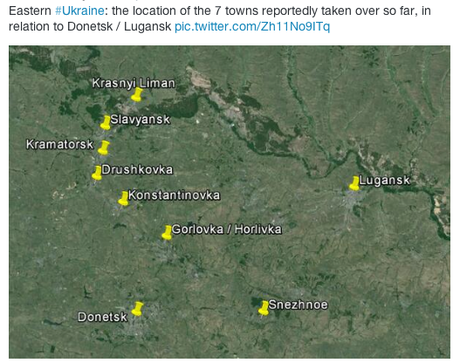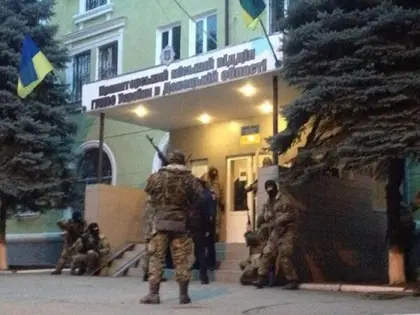In
addition to Slovyansk, the district police station of Kramatorsk, a city 96
kilometers north of Donetsk with a population of 200,000, has late night on April 12 been the scene of more
pro-Russian separatist activity.
JOIN US ON TELEGRAM
Follow our coverage of the war on the @Kyivpost_official.
The armed takeover of the Kramatorsk police station in Donetsk Oblast
Pro-Russians have tried taking it over, and its fate remains
unclear as gun
shots have been recorded in and outside the compound of the
main police station in Kramatorsk, a city known as a mechanical
engineering center.
Armed men stormed the building, said the
Interior Ministry. The law enforcement website says that “a shootout is
happening between police and unknown armed men.“
In Chervoniy Lyman, a district center of 20,000 people on
the northern edge of Donetsk Oblast, Interior Minister Arsen Avakov said an
attack on the local police station “by Russian forces” was repelled three hours
ago.
The alleged Russians were armed with Russian-made AK 100
submachine guns that are only used by Russian military forces, said Interior Minister
Arsen Avakov.
In Slovyansk, mobile communication towers have been
destroyed, said Avakov. Earlier
on April 11, pro-Russian forces, some of whom are suspected Russian
military soldiers, had taken over the local police station and Security Service
(KGB-successor agency) building in Slovyansk. Road blocks and check points were
set up by pro-Russian forces at the same time.
“The government of Ukraine considers the facts of the
present day as a manifestation of external aggression by Russia,” reads the
Internal Ministry’s website.
Pro-Russian forces still occcupty the regional legislature building in Donetsk and the SBU building in Luhansk.
Kyiv Post editor Mark
Rachkevych can be reached [email protected].

Editor’s Note: This article has been produced with support from the project www.mymedia.org.ua, financially supported by the Ministry of Foreign Affairs of Denmark, and implemented by a joint venture between NIRAS and BBC Media Action.The content in this article may not necessarily reflect the views of the Danish government, NIRAS and BBC Action Media.
You can also highlight the text and press Ctrl + Enter



